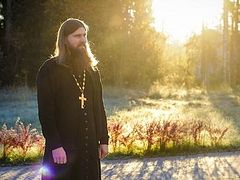 Vsevolod Tarasevich. Passengers on a soviet bus
Vsevolod Tarasevich. Passengers on a soviet bus
It was May of 1984. I found out from Metropolitan (and future Patriarch of Moscow and All Russia.—Ed.) Alexiy that Pukhtitsa Convent would be hosting a theological seminar, with representatives from many Christian confessions—members of the Conference of European Churches who would be arriving from all the republics of the Soviet Union. The monastery had everything needed to hold such a large-scale gathering—it could accommodate the guests at a newly built hotel, but what’s more, it had a rather spacious conference hall on the second floor of the hotel fully equipped by that time. The Metropolitan made arrangements for many local clergymen from Tallinn to handle the organization of various matters related to this seminar.
I was personally delegated by Vladyka Alexiy to escort an assistant to a senior minister of one of the Ukraine’s major Protestant confessions on a local bus ride (neither I nor the diocese had any other transportation available at the time) to the seminar venue. Luckily, I wasn’t vested with any missionary task—something like an assignment to knock the false beliefs regarding faith from the head of my companion or have him accept Orthodoxy—so I left the Metropolitan’s office with an easy mind. However, the closer the date of the assigned mission, the more annoyed I felt. First of all, I was not too enthused about spending a full three hours traveling side by side with someone whose religious beliefs were foreign to mine, even if not completely. Secondly, I would have to make it seem, as a matter of mere politeness and for hospitality’s sake, as if I agreed he was a member of one of the Churches, even though in my heart I knew he represented one of the sects—otherwise, why on earth did I attend a course on sectarian studies in the seminary?
Finally, the thought that a conversation regarding confessional divisions is inevitable, and whether my seminary knowledge was enough not only to repel the attacks of an admittedly unpleasant guest but also to launch an offensive, gave rise to a treacherous feeling of self-doubt. I knew well where it came from: I had learned from my limited experience of dealing with sectarians that it’s never enough for them to hear what such and such biblical text says, as they will definitely seize upon a chance to insist that you quote the exact chapter and verse from the source, otherwise they won’t back off. At the same time, they would spin off quotes, more often than not out of context, yet solemnly announcing every time: chapter so and so, such and such verse.
As I pondered it, I recalled the time when I studied at the seminary. Our sectarian studies teacher, a gloomy elderly man, made us learn by heart whole sections from the Holy Scripture, making sure we also learned the chapter and a verse (or verses) of a given paragraph as he convinced us correspondence course seminarians that we will surely find it useful in the future. Now I hate to say it but I understood that it could have been very useful in this situation—yet there was nothing left for me to do but regret that I hadn’t mustered the strength to learn it all by heart then, and had nothing to offer to my opponent now. At the same time, in my home library, I had a rare pre-revolutionary edition of the book called, Missionary Guide to the Holy Bible; but I had little time left to reach for it as the last straw.
Finally, the day arrived when I had to meet and escort our guest who had no inkling about how much he had already annoyed me due to my suspicions about the challenges I was about to face in our conversation. The said representative of a Protestant confession turned out to be a man in his mid-forties, well-groomed, with a frank look in his eyes, dressed in a cheap-looking grey suit and worn-out shoes. In his left hand he held a large brown briefcase bloated at its base. We shook hands. I told him my name and rank, while he introduced himself using his first name and patronymic—as he most likely had no doubt that I already knew other personal details about him.
“A scholastic?” he asked mockingly, giving me a tight handshake.
“No,” I answered, smiling wryly in an attempt to show him that I was the wrong guy to ask about scholasticism.
Judging by his look, his thought was: “Aha, don’t even tell me!”
“How was your flight?” I changed the topic, setting my hand free and inviting him to take his seat on the bus.
“Great!” he reported loudly in reply, trying to insert his briefcase into the shelf above our seats.
I rushed to assist him. With our joint efforts, we somehow managed to hoist it into its place. I thought that my guest was taken aback by my refusal to be called a scholastic, and so to defuse the situation, I began asking him all those typical questions people ask each other at their first meeting. Little by little, we got a conversation going smoothly. Meanwhile, our bus left Tallinn and was travelling along the Leningrad Highway towards our destination. That’s when I remembered that it’s high time to offer our guest some coffee with sandwiches, which my wife had prepared for our trip. Upon hearing about coffee and sandwiches, he noticeably perked up, especially when he saw that the open-faced sandwiches had salted salmon on top. Sensing his excitement, I added that my wife had salted the salmon herself. Keeping our hands busy with food, we turned to eating in silence, appreciating each in his way the fortuitous combination of fatty salted salmon and fresh white bread, rinsed down with coffee and cream.
This break in our conversation gave me time to analyze the first stage of our meeting: First of all, we are dealing with a man of unsophisticated education, or so I figured. It surely seemed this way, since in calling me a scholastic he apparently saw no difference between Catholics and Orthodox; and I hastened to award myself a goal for good observation skills.
I have already seen similar examples of ignorance in the sectarian world—I was thinking about how I was once literally attacked by an elderly nurse at a local outpatient clinic’s check-in desk who was, as I figured out, a follower of the Seventh-day Adventist sect. Once she saw in my medical file that I am a priest, and obviously thinking she mustn’t miss her chance to “save” my soul, she set to grilling me loudly about how we, the Orthodox, are awful sinners because we don’t observe the Sabbath day. I tried, as gently as I could, to reassure her that her accusation would be correct were she facing a Catholic, not an Orthodox, since the latter do observe the Sabbath day. “Here is another, still unfamiliar to me, member of a sect,” I thought, shifting my gaze to my guest still munching on his food, “who doesn’t know what he is talking about.” Realizing that I was watching him, my guest, contrary to my observations, looked at me with a smile and instantly made me feel sorry, as if I had deceived him. So I resolved to assume a more amicable posture. We were finally done with our food and I secretly hoped that after a wholesome snack my guest would be dozing off, humbly succumbing to the ergonomics of his bus seat. But there was nothing doing!
Pausing for a moment, he cautiously, like a hunter fearing to spook his game, took to questioning me about whether we have any preachers capable of inflaming an audience, and giving me no time to reply, brought out the example of Billy Graham who was expected to arrive in Estonia shortly.
To this I replied that our understanding of what a proper sermon should be is far removed from the Western religious shows held at the stadiums. I knew that my judgment irked our guest, and he returned the “favor.” He immediately hit back, saying that his brothers in the faith, after hearing sermons in Orthodox churches, would mock the Orthodox priests who read their sermons from notes and kept appealing to the congregation, “Orthodox brothers and sisters!” after almost every sentence. That’s when I remembered, quite handily, an important line by the Apostle Paul, which I immediately quoted: There are diversities of gifts, but the same Spirit (1 Cor. 12:4), adding that some Orthodox priests are better at giving sermons while others, for example, are excellent at praying.
The quote from the Apostle’s Epistle noticeably relaxed my companion and he amicably uttered, “I agree. By far not every preacher is skilled at giving sermons.” He continued, “We have a running joke about it: One beginner preacher was assigned to preach on the topic of the creation of man. He turned for advice to a seasoned preacher: ‘Tell me, brother, how should I compile my sermon?’ ‘Find an analogy to your topic in the Bible, and structure your sermon based on the comparison,’ advised the more experienced brother, failing to explain what an analogy is. On Sunday, the novice preacher’s sermon sounded something like this: ‘God created man, brothers and sisters, measuring three hundred cubits in length, fifty cubits in width, and thirty cubits in height, and then … coated him with pitch. I can believe,’ he continued, ‘that the first man was that big, but why he needed to be covered with pitch, that I can neither fathom or understand,’ that hapless preacher concluded his sermon.”
Seeing that his anecdote didn’t quite amuse me, my guest apparently decided to change his tune. He asked me what place ecumenism had among various confessions in Estonia. I honestly replied that at the moment, parish life is my top priority.
“As for me, my guest replied”, I have been taking part in the activities of ecumenical organizations for years. To tell you the truth,” he continued with a smile,” even my brothers in the faith would ask me sometimes, ‘How can you associate with the unregenerate?’”
This phrase stung me, even though I’d heard it before from other sectarians and knew that it partly had to do with their negative treatment of Baptism without full immersion and Baptism of infants. Remembering that he was my guest, after all, I suppressed the desire to deal a caustic blow to his fellow sectarians and confined myself to saying that whenever anyone treats the matters of economia from the perspective of akriveia, he inevitably falls into grievous errors. I intentionally used these terms, most likely foreign to him, to avoid any further discussion of this topic that could result—as I knew myself too well—in an explosive argument, when the opposing side doesn’t accept the obvious. It turned out I was right and the guest promptly switched to discussing theological education.
He seemed quite excited to glean from me that I had graduated from a seminary and currently studied at the academy, as he obviously decided to check how well-trained the students of our theological schools are. As there was no escaping him, I gave up my longing to have a snooze and was forced to continue our conversation. Even if you could easily tell my counterpart came from the “proletariat”, yet he didn’t quite resemble those die-hard sticklers you’ll find among sectarians who rarely if ever listen to their opponent’s argument and continually make elementary logical errors, such as switching the out the argument’s main thesis without even being aware of it. It’s true though that our guest raised his voice a couple of times during our argument, flatly stating the things like, “The Bible doesn’t agree with you!” or “The Bible doesn’t agree with him (as in the case of one of the holy fathers)!”
Every time he exclaimed something like that, other passengers would turn their heads and stare us down to make us the center of everybody’s attention. It forced us to speak in hushed voices, but then the volume would gradually increase again. The next time I was told that the Bible doesn’t agree with someone, I couldn’t resist asking him derisively:
“Did the Bible announce this to you?”
“You should consider that it did!” replied my opponent with a smile, thus letting me know that he took it as a joke.
I smiled back and then asked him whether he believes that some confessions often attempt to pass off their level of understanding of the Bible as the Bible’s “own voice.” And wouldn’t it be fair to say that it is our understanding of such and such passage or particular saying from the Bible, instead of proclaiming: “The Bible doesn’t agree!” or “The Bible agrees!”
“Well,” sighed the guest, “I can’t deny that we often come across these problems in our congregations when a brother suddenly announces at a gathering that God revealed to him that such and such verse from the Bible should be understood this way and not the way their congregation had previously understood. He can’t say that he arrived at this conclusion on his own, but he will surely add that God revealed it to him. Inevitably part of the congregation would side with him, and a new split would occur.
Just before we came to Pukhtitsa, the guest asked me another question:
“Why does it happen that whenever intellectuals join our congregations, they never stick around very long but soon leave to join the Orthodox Church?”
I was pleased to hear such an admission, so I whole-heartedly replied:
“It is likely because in Orthodoxy they find more profound answers to matters of faith.”
Our guest shrugged his shoulders in response, and we proceeded to exit the bus at its destination.
That’s when my opponent asked me with a smile, demonstrating that he expects to hear an honest answer:
“Is it true that the nuns in the monastery take a vow of chastity?” And then he added, “I have a hard time believing it.”
He looked straight into my eyes, determined to pick up even the slightest hint of hesitation. I stoically held his stare, especially since I had nothing to hide, and then replied that it would be a lie to say that the monastic garments free their bearer from the need to fight passions, including carnal passions.
“However,” I continued, “the timely disclosure of your thoughts to your spiritual confessor, obedience, prayer, labor to the point of exhaustion, and participating in the Sacraments of the Church do attract the grace of the Holy Spirit. With its help, the sisters are saving themselves from the temptations of this world.”
I checked myself at the last sentence: My apologetic speech sounded too ostentatious. With that, I added less authoritatively that I served as a deacon in this monastery for three years, and during that time none of its 150 sisters had left it except for one novice who, after having stayed there for a short period, came to realize it wasn’t her calling. It was rumored that she got married soon afterward.
“But that’s what I was telling you!” I instantly read in his look. I shook my head, letting our guest know that I don’t agree with him, and explained that the novices do not take monastic vows, which include the vow of chastity.
“Besides,” I added, “no one is forcibly held in the monastery and you can leave it at any moment.
The guest nodded in approval and then said something I never expected to hear:
“As for us,” he said lowering his voice, “some of our brothers made a vow of chastity; as a result, some of them failed and got married while others castrated themselves.
“Castrated themselves?” “I almost blurted out, so stupefied I was by this admission. From the seminary course on the general history of the Church, I knew that during the first centuries of Christianity there were such zealots who literally took the text of the Gospels where Christ, speaking of chastity for the sake of the Kingdom of God, compares it with making themselves eunuchs, so they … castrated themselves. Subsequently, the Church condemned self-castration and this phenomenon fizzled out. Managing to hide the initial shock, I tried to show sympathy for those poor wretches who resorted to such a drastic measure, while I didn’t think it right to discuss his fellow believers’ actions, which might have offended our guest. Besides, we had almost reached the monastery gates.
As soon as we were inside the gates, we came across a tall man who stopped abruptly, stretched out his hand to my companion with a smile, greeting him in Russian with a strong Estonian accent. My fellow traveler also warmly greeted him and then introduced me to the newcomer. He offered his hand saying that he is a pastor and told me his name. It was clear these men knew each other well and most likely belonged to the same confession. Then my companion, speaking to the pastor, gave me a compliment, which sounded something like: “This Orthodox guy, even if he’s as unregenerate as they all are, isn’t lost beyond hope as we often think of them.” I was barely able to suppress a laugh because I immediately thought, “What would I say about my companion if I had to introduce him to one of our priests? Most likely something very similar: “This sectarian, despite being lost like all of them, isn’t lost beyond hope as we tend to think about them.” Once I escorted the guest to the monastery hotel and took care of his and my accommodations, I breathed a sigh of relief because my mission to deliver him to the monastery was completed.
I said goodbye to my companion, but I have a lasting impression of that shocking admission. “Don’t these cases of self-castration,” I was wondering,” bear testimony to the fact that once the sects got separated from the one and whole body of the Church, they lost grace as the only way to acquire all kinds of virtues, including chastity? What option is left to those societies? All that remains for them is to get by with natural virtues and there’s apparently no denying that they have them.” Just like my companion—a personable man and most likely sincere about his faith—he obviously didn’t believe that in our Church one can acquire the spiritual virtues that are incomparably superior to the natural virtues. The former cannot be acquired only through our own efforts, but only when the grace of God acts within us.





